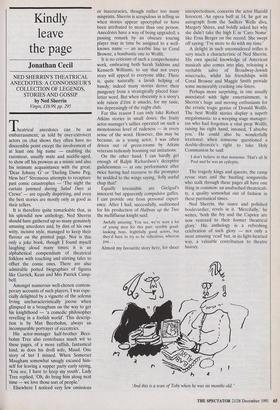Kindly leave the page
Jonathan Cecil
NED SHERRIN'S THEATRICAL ANECDOTES: A CONNOISSEUR'S COLLECTION OF LEGENDS, STORIES AND GOSSIP by Ned Sherrin Virgin, ,f16.99, pp. 295 Theatrical anecdotes can be an embarrassment; as told by over-extrovert actors on chat shows they often have no discernible point except the involvement of at least one big name — enabling the raconteur, usually male and middle-aged, to show off his prowess as a mimic and also his intimate acquaintance with the great: `Dear Johnny G' or 'Darling Dame Peg, bless her!' Strenuous attempts to recapture past comic catastrophes — 'The night the curtain jammed during Salad Days at Crewe° — are equally dispiriting, and even the best stories are mostly only as good as their tellers.
It is therefore quite remarkable that, in his splendid new anthology, Ned Sherrin should have gathered up so many genuinely amusing anecdotes and, by dint of his own witty, incisive style, managed to keep their flavour on the printed page. Nor is this only a joke book, though I found myself laughing aloud many times; it is an alphabetical compendium of theatrical folklore with touching and stirring tales to offset the comic ones. There are also admirable potted biographies of figures like Garrick, Kean and Mrs Patrick Camp- bell.
Amongst numerous well-chosen contem- porary accounts of such players, I was espe- cially delighted by a vignette of the solemn Irving uncharacteristically jocose when glimpsed in a brougham on the way to get his knighthood — 'a comedic philosopher revelling in a foolish world'. This descrip- tion is by Max Beerbohm, always an incomparable portrayer of eccentrics.
His actor-manager half-brother Beer- bohm Tree also contributes much wit to these pages, of a more raffish, fantastical kind, as does his droll wife, Maud. One story of her I missed. When Somerset Maugham somewhat smugly excused him- self for leaving a supper party early saying, `You see, I have to keep my youth', Lady Tree replied, 'Oh, do bring him along next time — we love those sort of people.'
Elsewhere I noticed very few omissions or inaccuracies, though rather too many misprints. Sherrin is scrupulous in telling us when stories appear apocryphal or have been attributed to more than one person. Anecdotes have a way of being upgraded; a passing remark by an obscure touring player may in time be assigned to a well- known name — an acerbic line to Coral Browne, a bombastic one to Wolfit.
It is no criticism of such a comprehensive work, embracing both Sarah Siddons and Kenneth Williams, to say that not every story will appeal to everyone alike. There is, quite naturally, a lavish helping of bawdy; indeed many stories derive their pungency from a strategically placed four- letter word. But when obscenity is a story's sole raison d'être it smacks, for my taste, too depressingly of the rugby club.
For this reason I can only take Robert Atkins stories in small doses; the fruity actor-manager's sallies operated on such a monotonous level of rudeness — in every sense of the word. However, this may be because, as a young actor, I was often driven out of green-rooms by Atkins veterans tediously booming out imitations.
On the other hand, I can hardly get enough of Ralph Richardson's deceptive guilelessness — at one performance after twice having had recourse to the prompter he nodded to the wings saying, 'Jolly useful chap that!'
Equally irresistible are Gielgud's innocent but apparently compulsive gaffes. I can provide one from personal experi- ence. After I had, successfully, auditioned for his production of Halfway up the Tree the mellifluous knight said:
Awfully amusing. You see, we've seen a lot of young men for this part: terribly good- looking boys, frightfully good actors, but they'd have to try to be ridiculous, whereas you
Almost my favourite story here, for sheer unexpectedness, concerns the actor Harold Innocent. An opera buff at 14, he got an autograph from the Sadlers Wells diva, Margery Shires, and boldly asked her why she didn't take the high E in 'Caro Nome' like Erna Berger on the record. She swept off saying: 'I've more to do with my time.'
A delight in such unconsidered trifles is very much a characteristic of Ned Sherrin. His own special knowledge of American musicals also comes into play, releasing a veritable salvo of Broadway-Jewish wisecracks, whilst his friendships with Coral Browne and Maggie Smith provide some memorably crushing one-liners.
Perhaps more surprising, in one usually associated with light entertainment, is Sherrin's huge and moving enthusiasm for the erratic tragic genius of Donald Wolfit. The best Wolfit stories display a superb megalomania: to a weeping stage manager- ess who had forgotten a vital prop Wolfit, raising his right hand, intoned, `I absolve you.' He could also be wonderfully irrational: when someone questioned a double-divorcée's right to take Holy Communion he said:
I don't believe in that nonsense. That's all St Paul and he was an epileptic.
The tragedy kings and queens, the camp revue stars and the hustling songsmiths who stalk through these pages all have one thing in common: an unabashed theatricali- ty, a quality somewhat out of fashion in these puritanical times.
Ned Sherrin, the suave and polished boulevardier, revels in it. 'Mercifully,' he writes, 'both the Ivy and the Caprice are now restored to their former theatrical glory.' His anthology is a refreshing celebration of such glory — not only a most amusing 'read' hut, in its light-hearted way, a valuable contribution to theatre history.
And this is a scan of Toby when he was six months old.'










































































































 Previous page
Previous page